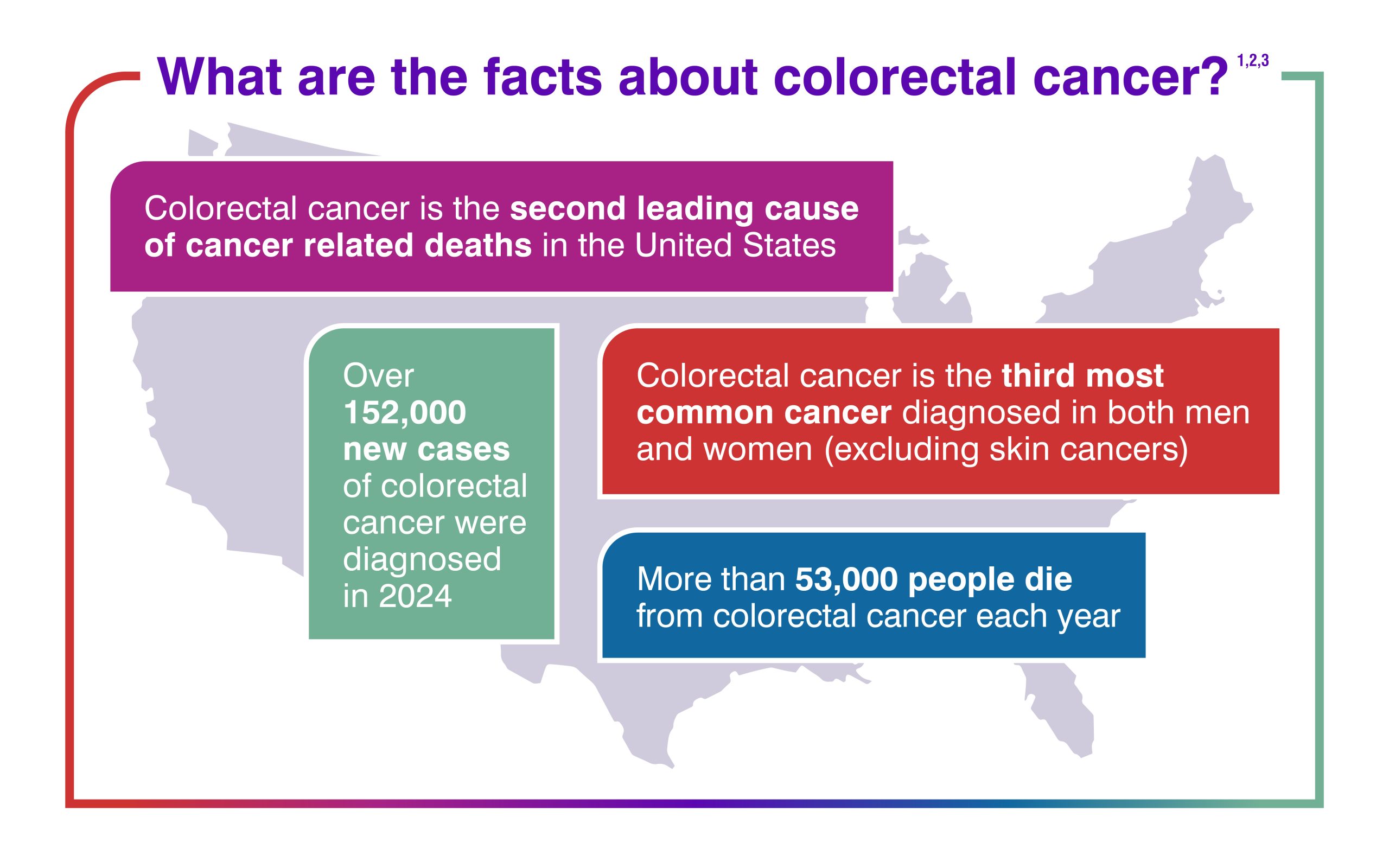Understanding Colorectal Cancer and the Screening Options
What is colorectal cancer?1
Colorectal cancer is cancer that starts in the colon or rectum. In most people, colorectal cancers develop slowly over a period of several years. Before a true cancer develops, it usually begins as a noncancerous polyp on the inner lining of the colon or rectum, which may eventually change into cancer.

What are risk factors for colorectal cancer?4
- Age
- Inflammatory bowel disease such as Crohn’s disease or ulcerative colitis
- A personal or family history of colorectal cancer or colorectal polyps
- A genetic syndrome such as familial adenomatous polyposis (FAP) or hereditary non-polyposis colorectal cancer (Lynch syndrome)
- Lifestyle factors that may contribute to an increased risk of colorectal cancer include:
- Lack of regular physical activity
- A diet low in fruit and vegetables
- A low-fiber and high-fat diet, or a diet high in processed meats
- Overweight and obesity
- Alcohol consumption
- Tobacco use
What are some available tests for Colorectal cancer screening?4
Stool Tests
- The fecal immunochemical test (FIT) uses antibodies to find hidden blood in your stool. Test collection is easier than ever allowing you to collect a one-time sample in the comfort of your own home. The test is done once a year and does not require dietary or medical restrictions.
- The guaiac-based fecal occult blood test (gFOBT) uses the chemical guaiac to detect blood in the stool. It is done once a year. For this test, you receive a test kit from your health care provider. At home, you use a stick or brush to obtain a small amount of stool. You return the test kit to the doctor or a laboratory, where the stool samples are checked for the presence of blood.
- The FIT-DNA test (also referred to as the stool DNA test) combines the FIT with a test that detects altered DNA in the stool. For this test, you collect an entire bowel movement and send it to a laboratory, where it is checked for altered DNA and for the presence of blood. It is done once every 3 years.
What are the current guidelines for colorectal cancer screening?4
Stool-based tests are the only screening tests recommended by national guidelines. Screening is recommended for all adults aged 45 to 75. The decision to be screened between ages 76 and 85 should be made on an individual basis.
You may need to be tested earlier than age 45, or more often than other people if you have:
- Inflammatory bowel disease such as Crohn’s disease or ulcerative colitis.
- A personal or family history of colorectal cancer or colorectal polyps.
- A genetic syndrome such as familial adenomatous polyposis (FAP) or hereditary non-polyposis colorectal cancer (Lynch syndrome).
Colorectal Cancer Screening with BioReference
BioReference’s FOBT/FIT (fecal immunochemical test) offers a number of advantages to make the testing process easier, including:
- One-time sample collection
- No dietary or medicinal restrictions
- Simple, no mess collection method
- Conveniently provided mailing pouch
Speak with your healthcare provider for more information on the appropriate screening option for you.
References
- American Cancer Society. January 29, 2024. Accessed February 18, 2025. What Is Colorectal Cancer? | How Does Colorectal Cancer Start? | American Cancer Society
- S. Cancer Statistics Working Group. U.S. Cancer Statistics Data Visualizations Tool. U.S. Department of Health and Human Services, Centers for Disease Control and Prevention and National Cancer Institute. June 2024, Accessed February 28, 2025. https://www.cdc.gov/cancer/dataviz.
- Cancer Stat Facts: Colorectal Cancer, National Cancer Institute. Accessed February 18, 2025. Colorectal Cancer — Cancer Stat Facts
- Colorectal Cancer. Centers for Disease Control and Prevention. Accessed February 18,2025. Colorectal Cancer | Colorectal Cancer | CDC




















